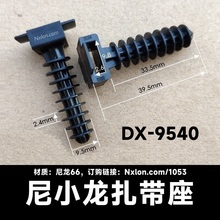Wave Spring Washer
©Nxlon.com D/T:

The wave spring washer is an elastic washer with a unique wavy structure. The following is a detailed introduction to it:
Structural Features of the Wave Spring Washer
It is wavy, with multiple wave crests and troughs. This special shape enables it to produce elastic deformation when subjected to pressure, thus providing elastic force.
There are different types. For example, the WG type is an open type and can be installed in a relatively small space; the WL type is a lapped type; the WN type belongs to the multi-layer wave crest overlapping type. Under the same compression stroke, the K-value curve is relatively gentle, which is suitable for situations where a large elastic force is required and the elastic force release during the working stroke needs to be uniform.
Working Principle of the Wave Spring Washer
When the wave spring washer is installed between the bolt or nut and the connected component, during the process of tightening the bolt or nut, the washer undergoes elastic deformation due to the axial pressure. Its wavy structure allows the washer to store energy. When the connected component is affected by vibrations, impacts, or other external forces, it can absorb and buffer these forces through elastic deformation, thereby maintaining the tightness of the connection and preventing the bolt or nut from loosening.
Advantages of the Wave Spring Washer
Good Elasticity and Buffering Performance: It can effectively absorb vibration and impact energy and protect the connected components from damage. For example, in components such as the engine and suspension system of an automobile, it can reduce the wear and fatigue caused by vibrations.
Uniform Load Distribution: It can evenly distribute the load on the connection surface, avoiding local stress concentration and improving the reliability and stability of the connection. For instance, in the mechanical manufacturing industry, when used to connect bolts and nuts and fix various machine parts, it can make the parts receive more uniform forces.
Small Space Occupancy: Due to its unique wavy design, under the condition of providing the same elastic force, compared with other types of washers, the wave spring washer can be made thinner and occupies less axial space, making it suitable for installation in compact spaces. For example, in electronic devices, it can be used for fixing printed circuit boards, installing connectors, etc., saving space while ensuring the firmness of the connection.
Convenient Installation: The installation process is relatively simple, and no special tools are required, reducing the installation cost and time.
Application Fields of the Wave Spring Washer
Mechanical Engineering: It is widely used in the connection parts of various mechanical equipment, such as motors, reducers, machine tools, etc., to prevent bolts from loosening and ensure the normal operation of the equipment.
Automotive Industry: It is widely used in the bolt connections of parts such as the engine, chassis, and body of automobiles, helping to reduce vibrations and noises and improve the comfort and reliability of the automobiles.
Aerospace: It is used for the connection of aircraft structural components, engine components, etc., and can ensure the safety and stability of the connection in an environment with high vibrations and impacts.
Electronic Equipment: It is commonly used in the assembly of the casings of electronic devices, the fixing of circuit boards, etc., to prevent the connection from loosening due to vibrations or collisions and protect the electronic components.
Material Selection of the Wave Spring Washer
Carbon Steel: It has high strength and hardness and a relatively low cost, and is suitable for ordinary mechanical connections in general working environments.
Stainless Steel: It has good corrosion resistance and oxidation resistance and is often used in corrosive environments such as wet conditions, acids, and alkalis, such as the connection parts in fields like chemical equipment and marine engineering.
Copper Alloy: It has excellent electrical conductivity and thermal conductivity and is mainly used in situations where electrical and thermal conductivity performance is required, such as in electrical equipment and electronic instruments.
Relevant Standards of the Wave Spring Washer
In China, there are standards such as GB/T 955 - 1987, which specify the specifications, dimensions, technical requirements, etc. of the wave spring washer. Internationally, for example, the DIN 137 standard classifies wave elastic washers into different types such as DIN 137(A) saddle-shaped elastic washers and DIN 137(B) wave elastic washers, and also makes detailed regulations on aspects such as their dimensions, tolerances, and materials to ensure the quality and interchangeability of the products.
尼小龙塑料螺丝-塑料螺母-尼龙垫圈-塑料铆钉
R3560-塑料铆钉-尼龙铆钉
订购链接:Nxlon.com/3560
R3560-塑料铆钉-尼龙铆钉塑料铆钉-尼龙铆钉-汽车塑胶铆钉-尼小龙尼龙铆钉R2.6R3.5R4R5塑胶柳钉子母铆钉快捷紧固件塑料卡扣。
绝缘塑料法兰螺母
订购链接:Nxlon.com/1034
尼龙法兰螺母的螺纹规格有:M3*0.5、M4*0.7、M5*0.8、M6*1.0、M8*1.25、M10*1.5、M12*1.75等白色尼龙螺母、黑色塑料螺母、透明塑料法兰螺母。
R2648-塑料铆钉-尼龙铆钉
订购链接:Nxlon.com/2648
R2648-塑料铆钉-尼龙铆钉塑料铆钉-尼龙铆钉-汽车塑胶铆钉-尼小龙尼龙铆钉R2.6R3.5R4R5塑胶柳钉子母铆钉快捷紧固件塑料卡扣。
R2040-塑料铆钉-尼龙铆钉
订购链接:Nxlon.com/2040
R2040-塑料铆钉-尼龙铆钉塑料铆钉-尼龙铆钉-汽车塑胶铆钉-尼小龙尼龙铆钉R2.6R3.5R4R5塑胶柳钉子母铆钉快捷紧固件塑料卡扣。
R3045-塑料铆钉-尼龙铆钉
订购链接:Nxlon.com/3045
R3045-塑料铆钉-尼龙铆钉塑料铆钉-尼龙铆钉-汽车塑胶铆钉-尼小龙尼龙铆钉R2.6R3.5R4R5塑胶柳钉子母铆钉快捷紧固件塑料卡扣。









